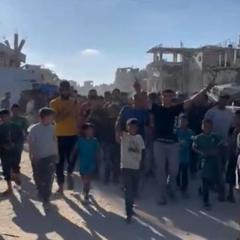More than 90 lorry loads of much-needed humanitarian aid have finally reached the Gaza Strip following significant delays attributed to security issues along approved routes, as the region grapples with a serious hunger crisis and increasing malnutrition rates.
Aid Reaches Gaza After Delays, Humanitarian Crisis Escalates

Aid Reaches Gaza After Delays, Humanitarian Crisis Escalates
UN reports collection of aid amidst ongoing humanitarian challenges in Gaza.
More than 90 lorry loads of humanitarian aid have finally been collected by UN teams inside the Gaza Strip, three days after Israel lifted an 11-week blockade. The aid, which included essential supplies like flour, baby food, and medical equipment, was picked up from the Kerem Shalom crossing and transported to warehouses for distribution. Images from the scene illustrated the critical impact of the aid, with flour being unloaded at a bakery in Khan Younis, where local production was able to resume partially.
As the humanitarian situation continues to deteriorate, the UN has expressed that the peak of aid delivered is "nowhere near enough" to meet the dire needs of Gaza’s 2.1 million residents. Recent assessments have highlighted alarming food insecurity levels, warning that around half a million people could face starvation in the coming months. The UN reported that delays were primarily due to insecurity on the route the Israeli military had authorized for aid transport, which posed risks for aid drivers and was deemed dangerous by humanitarian organizations.
Despite Israeli authorities permitting an additional 100 lorry loads of aid, international relief agencies stressed that it falls short compared to the vast needs of the population. Antoine Renard, a senior official of the World Food Programme (WFP), highlighted that each truckload of flour is valued at approximately $400,000 at local market prices, and stressed the necessity of significantly increasing the flow of aid to mitigate growing anxiety and desperation among civilians.
Tensions remain high as Israel's military operations continue, with PM Benjamin Netanyahu indicating that food delivery must be controlled to avoid hindering military operations. However, a controversial new plan suggesting that aid be distributed through private companies, rather than through existing UN facilities, has raised concerns regarding the politicization of humanitarian assistance. UN and aid organizations have rejected this approach, emphasizing the importance of ensuring access to aid without conditionalities.
As Israeli bombardments persist, the humanitarian landscape in Gaza worsens with thousands displaced and mounting casualties reported on both sides. The ongoing military campaign initiated by Israel following Hamas's cross-border attack in early October continues to escalate the humanitarian crisis, leaving many residents desperately in need of immediate assistance.
As the humanitarian situation continues to deteriorate, the UN has expressed that the peak of aid delivered is "nowhere near enough" to meet the dire needs of Gaza’s 2.1 million residents. Recent assessments have highlighted alarming food insecurity levels, warning that around half a million people could face starvation in the coming months. The UN reported that delays were primarily due to insecurity on the route the Israeli military had authorized for aid transport, which posed risks for aid drivers and was deemed dangerous by humanitarian organizations.
Despite Israeli authorities permitting an additional 100 lorry loads of aid, international relief agencies stressed that it falls short compared to the vast needs of the population. Antoine Renard, a senior official of the World Food Programme (WFP), highlighted that each truckload of flour is valued at approximately $400,000 at local market prices, and stressed the necessity of significantly increasing the flow of aid to mitigate growing anxiety and desperation among civilians.
Tensions remain high as Israel's military operations continue, with PM Benjamin Netanyahu indicating that food delivery must be controlled to avoid hindering military operations. However, a controversial new plan suggesting that aid be distributed through private companies, rather than through existing UN facilities, has raised concerns regarding the politicization of humanitarian assistance. UN and aid organizations have rejected this approach, emphasizing the importance of ensuring access to aid without conditionalities.
As Israeli bombardments persist, the humanitarian landscape in Gaza worsens with thousands displaced and mounting casualties reported on both sides. The ongoing military campaign initiated by Israel following Hamas's cross-border attack in early October continues to escalate the humanitarian crisis, leaving many residents desperately in need of immediate assistance.




















